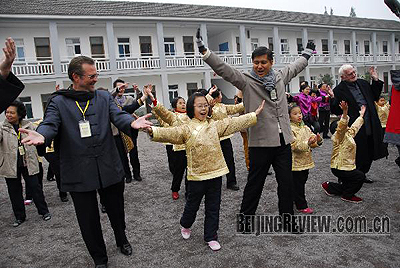|

Tangchi Town is more famous than ever, not for its hot springs spa that it has always been well-known for, but for its new culture. Its reputation has attracted visitors such as Greg Budd, a writer from Australia and his entourage, as well as experts from many other countries, including representatives from the United Nations Educational, Scientific and Cultural Organization (UNESCO). A small town with more than 2,000 years of history and about 48,000 residents, Tangchi in Lujiang County, central China's Anhui Province is now a synonym for peace and harmony.
Rudd is a China expert, as are several of his family members. He heard of the ancient Chinese saying that some places are so safe that people do not need to lock their doors at night. He found this true of the hotel he stayed in Tangchi. "In this town, people are very polite and friendly to each other. Even strangers are greeted with smiles," Rudd said.
"Many things in the world are not easy to do, but have to be done," Rudd commented. He was especially impressed with Lujiang Culture and Education Center, a non-profit school in Tangchi.
Lujiang Center has just entered its third year. The center is staffed with volunteers from home and abroad, including specialists who quit high-paying jobs to teach there. Teachers in the center are known to teach ethics and etiquette by example. "Before I came here, I was skeptical. Now I realize that the teachers are very faithful in practicing what they preach," Rudd remarked.
Chin Kung, the founder of the school, is in his eighties. He has served as visiting or honorary professor at the Renmin University of China and several other universities at home and abroad, teaching courses in conflict resolution and sociology. In recent years, Chin has attended many international peace conferences, advocating classical Chinese ethics education as a tool to resolve conflict and promote peace and stability. Many people agree with his lofty ideas, but think they are too good to work in practice.
Chin Kung piloted his ideas in his hometown by establishing the Lujiang Center. Local residents are taught classical philosophy, which embodies wisdom and experiences accumulated in over 5,000 years. "In the beginning, I thought that it would take three years to change the local culture. Yet I was surprised to find that local social capital has improved in less than half a year," he confided.
The Chinese ethical system implemented in Tangchi is centered on the family. At the heart of the Confucianism ethical system are the five moral disciplines of human relations, which state that: Faithfulness, or trust and loyalty, should exist between sovereign and subject; intimacy, or fatherly love and filial love, should exist between father and son; distinction, or differentiated responsibility, should exist between husband and wife; the younger should give precedence to the elder, or sisterly and brotherly love; and sincerity should reign over the relationship between friends.
Three of the five disciplines govern relations between family members. "Like the stars that follow their orbits, human beings also need to follow their tracks," said Cai Lixu, head of training of the Lujiang Center. "When each of us follows the right track, we are behaving ethically, and collision is avoided."
Cai added, "The teachers all have a strong conviction that nurture can prevail over nature." This has been illustrated in Chinese classics, which said, "Men are born nice, with similar human natures though different dispositions. If not taught properly, some will go astray."
During their cultural-exchange tours to Tangchi, many visitors have discovered stunning similarities among individuals, cultures, ethnical groups and religions. "If we let go of prejudices, open our hearts, and treat each other fairly and forgivingly, peace will ensue," said Jariyavidyanont. "From the eyes of Tangchi residents, I can read the happiness in their hearts. From them I learned that happiness comes from giving and loving. Sincerity breeds joys and joys are contagious."
Teachers at the center have empowered themselves and their students with ancient teachings such as, "Extend the respect for the elderly in one's family to that of other families; and extend the love of the young ones in one's family to that of other families."
"In fact, traditional culture teaches us not only to love ourselves but also other people in the world. It broadens our horizon and gives us an asset that we can hand down to the next generations," said Li Yiduo, Deputy Director of the Law School at Peking University, who instructs master students there.
Li Ying, a teacher in Beijing who visited Tangchi several times within half a year, believes that one should understand peace with the big picture in mind. "Peace and harmony will prevail if the walls between homes are torn down and people open up their minds and hearts," he said. "Here are peace and harmony. In silence we can hear the voice of Tangchi speaking, which touches our hearts."
|
